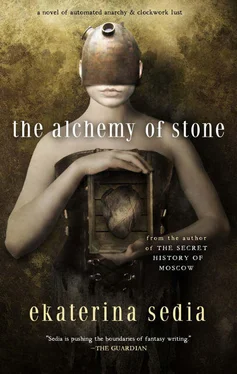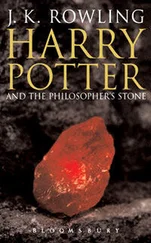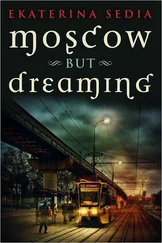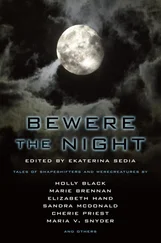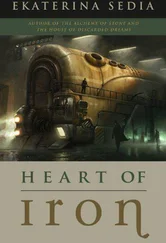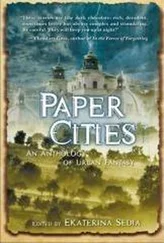The door was locked, but Mattie decided to wait. With the shrubbery so bold and unrestrained, she could sit on the front stoop, hidden by the glistening green wall studded with creamy and red roses, drinking in their sweet fragrance. She watched the sky turn deeper blue, and gingerly touched her face, exploring the new cracks. She extended her eyes to take a closer look, and her heart fell—there were so many, with whole chunks of porcelain missing, exposing the shining gears underneath. The corner of her lips was cracked horribly, and she thought that it almost mimicked Loharri’s injury—now she too had half a face maimed. The difference was that he could replace hers.
Loharri came home when the shadows from the hedge grew long enough to touch the walls of the house, to lap at the foundation and to reach up to the windows, gradually consuming the wall from the ground up. The rose bushes looked black in the dimming light, and the night flowers’ fragrance scented the breeze—Mattie smelled jasmine and gardenias, magnolias and lilacs in the thick night air, and almost missed the sound of familiar light footsteps on the path.
Loharri smiled at Mattie but his eyes remained tired. His clothes were rumpled as if he had slept in them, and the white collar and cuffs of his shirt bore long streaks of oil. His hands were stained, black semicircles of grime nestled under the fingernails of his usually clean hands. “Are you all right?” he asked. “Come on in; I’ll get the fire going.”
Loharri still signified home for Mattie, no matter how much she resented this fact. “You look tired,” she said. “Did you see the riots?”
He smirked. “Yes, I did. They burned down a few houses and made a racket before the Parliament. But right now, I just want a bath, a sandwich and a nice drink. Come on in.”
“I don’t want to disturb you,” Mattie said. Her words sounded perfunctory even to her; they both knew that Mattie’s presence would neither tax nor disturb him.
She followed Loharri inside, and it felt as though they had just returned from one of their excursions—it felt like coming home after a long absence. The smells she hadn’t noticed when she used to live here were obvious now—metal and oil, the weak scent of roses wafting through the open windows from the outside, an unfinished glass of tea left in the kitchen—and endearing in their familiarity.
“Go take your bath,” she told Loharri. “I’ll make you your tea and sandwich.”
“I have an automaton for that.”
She tilted her head. “I don’t mind.”
“Suit yourself.” His footfalls retreated into the interior of the house, and she listened to the weak sounds as she rummaged through the ice chest looking for cheeses and cold meat. She heard the running water, the rustling of clothes shed to the floor, a splash and a tired sigh.
She thought that Loharri seemed unusually subdued, considering the events of the past weeks, and especially today. Perhaps the telegraph clerk was right; perhaps there came a time when the most reasonable response was to sigh and ignore everything, because the heart could not absorb all the misery of the world without breaking. Perhaps they should just stay in the kitchen, the kettle bubbling merrily on the woodstove, the flames of the fireplace casting a bright glow on the dark walls, and talk nonsense, and watch the elaborate dance of the fireflies outside.
Loharri was apparently of the same mind—when he came into the kitchen, his hair dripping water onto the collar of his clean shirt, he held up his hand. “I really don’t want to talk about it.”
“Neither do I,” Mattie said. “I’m just worried about Iolanda—have you seen her today?”
He shook his head and gave her a sharp look. “Since when are the two of you best pals? She worries about you, you worry about her…”
“She bought some ointment for me,” Mattie said, settling for a half-truth rather than an outright lie or a confession. “She seems nice. And you like her, don’t you?”
He settled at the table and drank his tea. “It’s complicated, Mattie.”
She tilted her head. “Everything is complicated with you.”
“It’s a character flaw.” He smiled, then squinted up at her. “Don’t worry, she’ll be fine. But what happened to your face? Did you fall again?”
“Yes,” Mattie said. “No. I was watching the smoke over the city, and walked into a lamppost.” It was just ridiculous enough for him to believe it.
He smiled. “Oh, Mattie. I don’t have anything new for you, but maybe one of the prototypes will work for now.”
“Prototypes?”
“You don’t think I’d settle for a design without trying others, do you? Come on, I’ll show you.”
“Eat,” she said. “I’m not going anywhere.”
“Afraid of being home all by yourself?”
“No.” Afraid of being home with someone else, she thought, but never said it out loud. “Eat your sandwich.”
He obeyed, still smiling. “You don’t hate me as much as you make out, do you, Mattie?”
“Don’t talk with your mouth full,” she said. “And I never said I hated you.”
“You make a fairly good impression. No words needed, dear girl, and you know full well that I’m not entirely dim. Surely, you expected me to pick up on some of your mannerisms.”
“I just don’t want you touching me,” she said. “And I want my key.”
“I left it to you in my will,” he said. “You won’t kill me though, will you?”
“I’ll consider it,” she said.
He didn’t think her dangerous—if he did, he wouldn’t joke about it and pretend that her anger was indeed a concern to him. He occasionally enjoyed making a show out of capitulating to her, but only because they both knew he held more power. Not any more, Mattie thought. I hope that Iolanda is all right. She didn’t mind feeling selfish just this once—of course, her concern for Iolanda was more about Iolanda and Niobe than it was about the blood homunculus; but she couldn’t deny that the small bubbling creature figured in her thoughts prominently.
“This is nice,” he said. He finished his meal and sat back in his chair, stretching his long legs with a drawn-out sigh. “Just like the old times.”
Mattie inclined her head. “There was something you wanted to show me?”
He led her to his workshop, which seemed to grow more cluttered by the day. Under the piles of scrap metal and gear trains, racks and pinions, he found a large crate, uncharacteristically well-kept and neatly covered with straw. In it, there were several faces, and Mattie was surprised to discover that they were all different from the one she had worn until then. There were faces with thin noses and upturned noses, plump and narrow lips, high and low foreheads, and a wide variety of cheekbones. “This one sort of looks like you,” Loharri said and picked up a mask that indeed bore some resemblance to the face Mattie had grown accustomed to and recognized as her own—a face with rounded childish cheeks and wide eyes, with a small mouth smiling at some untold secret.
“I like this one better.” The face Mattie picked was unpainted and plain, with features that suggested neither youth nor wisdom of experience. It was a very average face, and Mattie suspected that Loharri considered it a failure and only kept it because he could rarely bear to throw anything away, on the off chance that he might decide that he needed it after all.
Loharri grimaced. “I’m usually not the man to criticize my own work, but I regret to say that you lack artistic taste, Mattie.”
“Can I have it?”
He shrugged. “Why not? It’s only temporary.” He helped her to put it on, and gave her a long appraising look. “Not terrible. But tell me something, my sweet machine, tell me—last time I visited, your face was already off. How’d you managed that?”
Читать дальше
